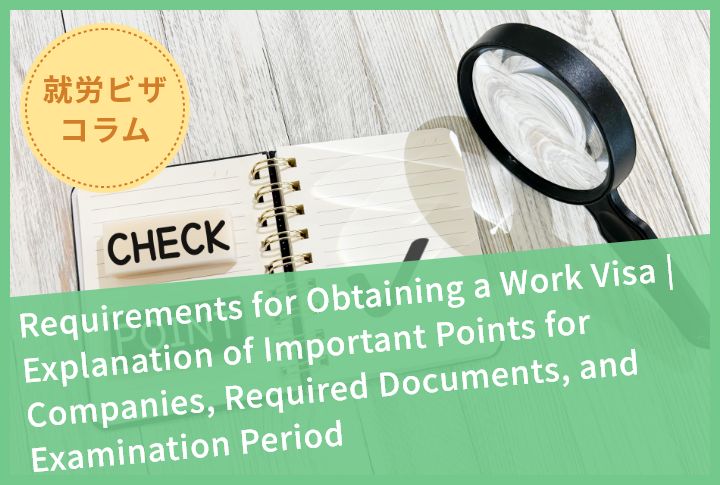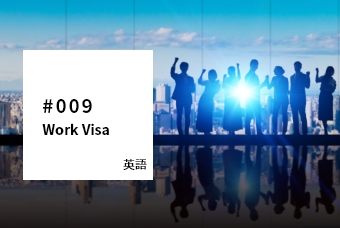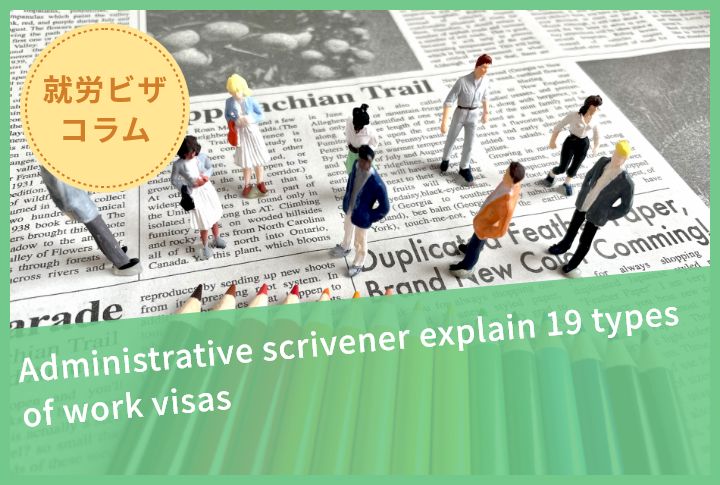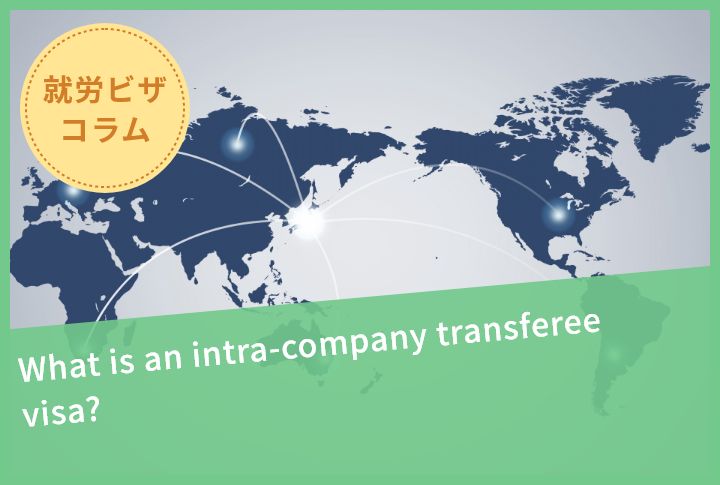Requirements for Obtaining a Work Visa | Explanation of Important Points for Companies, Required Documents, and Examination Period

For companies without experience in hiring foreign workers, the requirements for obtaining a work visa for foreigners may be unclear.
In this column, we aim to explain the requirements for obtaining a work visa for foreign workers as simply as possible, especially for companies considering hiring foreign workers in the future.
As if trouble occurs when hiring foreigners, in the worst-case scenario, serious penalties may be imposed. Therefore, understanding the requirements for obtaining a work visa is crucial from a compliance perspective.
By reading this column, you will learn the following:
- Requirements for obtaining a work visa
- Necessary documents for a work visa application
- Flow of hiring foreign workers
- Important points for companies when hiring foreign workers
Index
1. What is a work visa?
A work visa officially means “a status of residence that allows you to work,” and is a status granted by the Immigration Bureau for foreigners to work in Japan.
A visa is different from a visa (entry permit), which is an entry permit issued by Japan, and a visa, which means a status of residence, is a qualification that allows you to stay in Japan.
The “a status of residence that allows you to work,” or work visa, is required for foreigners wishing to work in Japan.
On the other hand, visas that do not permit work are applicable to foreigners coming to Japan for purposes such as cultural activities, training, short-term stays, study, or family visits.
Work-related statuses of residence are categorized into 19 types based on the activities foreigners intend to engage in while in Japan.
Click here to view the types of work visas
2. Requirements for obtaining a work visa
The requirements for obtaining a work visa can be summarized as follows:
- Engage in activities relevant to the type of visa
- Have graduated from a department or faculty related to the job
- Earn a salary equivalent to or higher than that of Japanese nations
- Work for a company with continuity and stability
For the representative work visa category, the “Technology/Humanities/International Affairs ” visa, individuals can engage in tasks related to natural sciences such as physics and engineering, humanities such as law and economics, and international fields.
The requirements for this visa category include educational background, practical experience, and qualifications. It is advisable to confirm these requirements in advance when applying.
For detailed information, please refer to Technology/Humanities/International Affairs visa.
3. Necessary documents for obtaining a work visa
Obtaining a work visa requires many documents, and the specific documents needed may vary depending on the category to which the employing company belongs.
The required documents typically include proof of the company’s business overview and job duties, as well as documentation verifying the foreign applicant’s educational background and work experience.
The main documents required are as follows:
- Application form
- Applicant’s photo (4×3 cm)
- Prepaid return envelope or reply postcard
- Statement of reasons for employment or invitation and explanation of job duties
- Applicant’s resume
- Certificate of highest education (diploma)
- Document(s) verifying employment history
For more information about the categories to which the employing company belongs, please refer to the following article:
Click here to view Categories of work visas
4. Procedure for obtaining a work visa when hiring foreigners from overseas
The method for obtaining a work visa differs depending on whether “the foreigner is overseas” or “the foreigner is already in Japan”.
First, let’s look at cases where foreigners are overseas.
4-1. Preliminary investigation to confirm the possibility of obtaining a work visa
The first step is to conduct a preliminary investigation to determine whether a foreign national is eligible to obtain a work visa.
This is because it’s necessary to verify whether the foreign national meets the aforementioned “requirements for obtaining a work visa.”
Among the requirements for obtaining a work visa, the first thing to investigate is the educational requirement and job duties.
First, regarding the educational requirement, verification is conducted using documents such as diplomas or graduation certificates to support the educational background listed on the resume.
The diploma typically includes the individual’s name, the name of the university, the date of issuance, the degree obtained, and the major.
By confirming this information, it can be determined whether the educational requirement is met, so be sure to request submission along with the resume.
Next, it’s important to confirm whether the intended job duties at the Japanese company comply with the law.
This is because if the job duties do not align with the activities specified in the Immigration Control Act, the work visa cannot be obtained.
Therefore, careful consideration of the job duties is necessary.
After confirming the job duties, the relevance between the educational background and job duties is assessed.
For example, in the case of obtaining a typical work visa such as the Technology/Humanities/International Affairs visa, the required educational background varies depending on the field.
In the technical and humanities fields, there is a certain degree of expectation for the relevance between the job duties in Japan and the educational background of the applicant, although the Immigration Bureau exercises flexibility in making this determination.
On the other hand, in the international affairs field, the necessity of such personnel is emphasized.
4-2. Conclusion of employment contract
Once it has been determined that a foreign national is eligible for lawful employment, the next step is to conclusion an employment contract before applying for a work visa.
This is because a formal employment contract is a prerequisite for applying for a work visa. Therefore, obtaining a work visa cannot precede the conclusion of the employment contract.
However, there are cases where a work visa cannot be obtained, and there is also the potential for disputes between the employer and the foreign national.
Therefore, to prevent labor disputes, it is recommended to include sentence in the employment contract such as “This contract shall be deemed invalid if the applicant does not possess a valid work visa and is unable to obtain landing permission in Japan.”
4-3. Application for Certificate of Eligibility
Once the employment contract has been concluded, the next step is to apply for a “Certificate of Eligibility” at the jurisdictional Immigration Bureau.
The Certificate of Eligibility is a document that proves that a foreign national residing abroad has been examined for permission to land in Japan by the Immigration Bureau.
By obtaining the Certificate of Eligibility, the process of obtaining a work visa at the overseas consulate can be expedited and carried out smoothly.
4-4. Sending the Certificate of Eligibility to the foreigner and applying for a work visa
After receiving the Certificate of Eligibility, it should be sent to the foreign national via international mail, and they should apply for a work visa at the overseas consulate.
The required documents are listed on the website of the consulate where the foreign national resides under the section “Documents required for visa application using the Certificate of Eligibility,” please check the requirements listed there before proceeding with the application.
4-5. After entry, completing various procedures such as resident registration
Upon entry into Japan, foreign nationals staying for more than 3 months must complete various procedures such as residential registration within 14 days from the date of establishing their residence at the municipal office with jurisdiction over their place of residence.
Required documents include:
- Passport
- Residence Card (Note: Not required if not issued at the airport)
If the Residence Card is not issued at the airport, it will be sent to the registered address by the Immigration Bureau within approximately 1-2 weeks after completing the residential registration at the municipal office.
5. Procedure for obtaining a work visa when hiring foreigners who are already in Japan
In this chapter, we will explain how to obtain a work visa for foreign nations who are already in Japan.
5-1. Confirmation of resident status and matching with job duties
To confirm whether a foreign national has the legal qualification to work, it is necessary to check their current residency status and match it with the intended job duties.
If the foreign national’s residency status is “Student,” for example, a change of residency status application will be required.
Similarly, if the individual already holds a work visa but the job duties significantly differ before and after changing jobs, it’s important to conduct a comparison and possibly apply for an Employment Qualification Certificate.
Regarding the Employment Qualification Certificate, please refer to the following information:
Click here to view What is an Employment Qualification Certificate?
5-2. Conclusion of employment contract
Conclusion of employee contract is the same as when hiring a foreign national from overseas.
5-3. Application for permission to change resident status
Once the employment contract is concluded, prepare the necessary documents and apply for a change of residency status.
As mentioned earlier, if the individual holds a Student visa or similar status, a change of residency status application is necessary.
It’s important to note that obtaining a work visa is not guaranteed even if all documents are submitted, so it’s crucial to thoroughly review the requirements for obtaining a work visa.
6. Time required to obtain a work visa
The period from applying for a work visa to obtaining it typically ranges from 1-2 months.
In most cases, considering that the preparation for the visa application usually takes about 1 month, it’s advisable to allow for a total period of 2-3 months from the start of document preparation until the approval of the work visa.
To avoid delays in activities such as orientation sessions or new employee training, it is crucial to plan the application for obtaining a work visa carefully and systematically.
7. Points to note for companies regarding obtaining a work visa
When obtaining a work visa for a foreign national, it’s not only the individual but also the company that needs to be cautious. In the worst-case scenario, there is a risk of penalties being imposed, so it’s essential to pay close attention to the following points:
7-1. Confirming whether the job duties comply with Immigration Control Act
The first point is to verify whether the foreign national’s job duties comply with Immigration Control Act.
The permissible activities for foreign nationals vary depending on the type of work visa. Engaging in activities not permitted by Immigration Control Act while receiving compensation could potentially constitute illegal employment, so it is necessary to be caution.
7-2. Verifying previous employment and educational background
The second point is to verify the foreign national’s previous employment and education history.
The required qualifications and experience vary depending on the desired work visa, so it’s essential to research or consult with experts rather than proceeding with ambiguous knowledge.
7-3. Acquiring minimum knowledge about employing foreigners
The third point is to acquire the minimum necessary knowledge regarding employing foreign nationals.
For example, labor laws, workers’ compensation insurance, enrollment in social insurance, income tax, and residence tax apply to foreign nationals similarly to Japanese nationals. When employing foreign nationals, apart from Immigration procedures that Japanese employees do not require, manage their employment similarly to Japanese employees.
7-4. Being cautious about facilitating illegal employment
The fourth point is to be mindful of facilitating illegal employment.
It’s crucial to note that even unintentionally, lacking accurate knowledge can lead to illegal employment.
Cases of illegal employment include:
- Foreign nationals working without proper residency status in Japan
- Foreign nationals overstaying their permitted residency period and continuing to work illegally
- Foreign nationals working without obtaining permission for activities beyond their permitted residency status
- Foreign nationals engaging in work beyond the scope of their granted residency status
Employing or facilitating the employment of foreign nationals illegally may lead to charges of aiding and abetting illegal employment (punishable by imprisonment for up to 3 years, a fine of up to 3 million yen, or both).
This is the most critical aspect for companies to be mindful of when employing foreign nationals.
8. Summary
When it comes to obtaining work visas for foreign nationals, it’s crucial for companies to acquire knowledge and provide support to foreign employees.
However, the legal aspects of foreign employment have become increasingly complex, and many seem to navigate through them with uncertainty.
By carefully reading the current Immigration Control Act, it becomes evident that companies bear significant responsibilities.
Failing to realize these responsibilities and making errors in foreign employment could lead to accusations of aiding illegal employment, as mentioned earlier.
At Administrative Scrivener Firm Daiichi Sogo Office, we prioritize protecting companies from Immigration Control Act risks associated with employing foreign nationals.
We offer free consultations, so if you have any questions or concerns about the process of obtaining work visas for foreign nationals, please feel free to contact us.
























